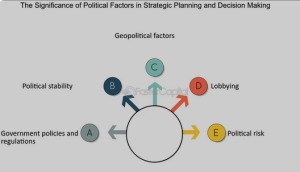Geopolitical factors have a significant impact on business strategy and decision-making. These factors include political stability, government policies, trade relations, regional conflicts, and international relations. Understanding and navigating geopolitical considerations are crucial for businesses operating in a globalized environment. Here’s how geopolitical factors influence business strategy:

Geopolitical Factors On Business Strategy And Decision-Making
-
Table of Contents
ToggleMarket Entry and Expansion:
- Impact: Geopolitical stability or instability in a region influences decisions related to market entry and expansion.
- Strategy: Businesses assess political risks and opportunities, considering factors such as government stability, rule of law, and the overall political climate before entering new markets.
-
Regulatory Compliance:
- Impact: Political decisions and regulatory changes can affect business operations, trade agreements, and industry regulations.
- Strategy: Businesses must adapt their strategies to comply with new regulations, navigate trade barriers, and stay informed about changes in government policies that may impact their industry.
-
Supply Chain Management:
- Impact: Geopolitical events, trade disputes, or conflicts can disrupt supply chains, affecting the sourcing of materials and components.
- Strategy: Businesses develop strategies to diversify suppliers, assess geopolitical risks in the supply chain, and implement contingency plans to mitigate disruptions.
-
Currency Risks:
- Impact: Geopolitical events often influence currency exchange rates, leading to fluctuations that can affect international transactions.
- Strategy: Businesses incorporate currency risk management strategies, such as hedging, to mitigate the impact of currency volatility on financial performance.
-
Trade Relations and Tariffs:
- Impact: Changes in trade relations and imposition of tariffs or trade barriers impact the cost of imports and exports.
- Strategy: Businesses monitor trade policies, engage in advocacy efforts, and consider diversifying markets to navigate changes in trade relations and tariff structures.
-
Risk Assessment and Scenario Planning:
- Impact: Geopolitical uncertainties introduce risks that can affect business operations and investments.
- Strategy: Businesses conduct comprehensive risk assessments and engage in scenario planning to anticipate and prepare for potential geopolitical risks and their impact on the business environment.
-
Political Stability for Investments:
- Impact: Investors and businesses consider political stability as a key factor for making long-term investments.
- Strategy: Businesses evaluate the political climate in potential investment locations and factor in stability considerations when making decisions on capital investments and expansions.
-
Crisis Management:
- Impact: Geopolitical crises, such as political unrest or armed conflicts, can pose immediate challenges to business operations.
- Strategy: Businesses develop crisis management plans to respond effectively to geopolitical crises, safeguard employees, and protect assets.
-
Corporate Social Responsibility (CSR):
- Impact: Geopolitical factors may influence a company’s CSR initiatives, particularly in regions with specific social or environmental challenges.
- Strategy: Businesses align CSR strategies with local needs and global sustainability goals, considering geopolitical context and societal expectations.
-
Diplomatic Relations and Global Partnerships:
- Impact: Diplomatic relations between countries influence cross-border collaborations and partnerships.
- Strategy: Businesses assess geopolitical alliances and diplomatic ties to inform decisions on international partnerships, joint ventures, and alliances.
-
Technology Transfer and Security:
- Impact: Geopolitical tensions can impact the transfer of technology, especially in industries with sensitive technologies.
- Strategy: Businesses assess and navigate technology transfer restrictions, export controls, and intellectual property protection in response to geopolitical considerations.
In summary, geopolitical factors are integral to the strategic decision-making process for businesses operating in a globalized world. Monitoring and understanding these factors, along with developing flexible and adaptive strategies, are essential for navigating the complexities and uncertainties associated with geopolitical dynamics.
